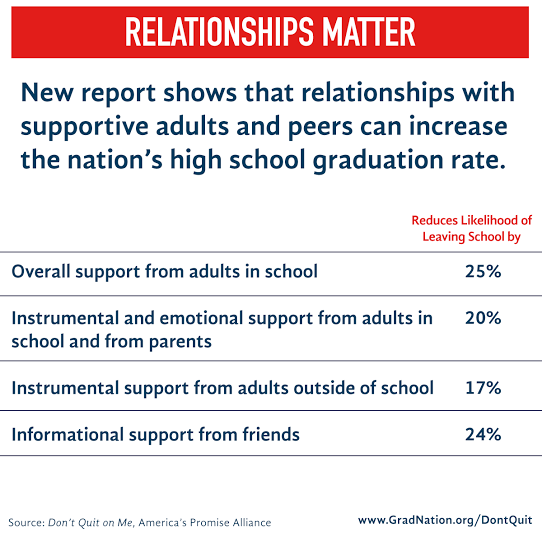By: John Gomperts, President & CEO of America’s Promise Alliance
Article Courtesy of America’s Promise Alliance
Add relationship poverty to the list of challenges facing young people who leave high school before graduating.
It’s not a lack of love or family, but a lack of access and connection to people who can help lead them to a more promising future. That’s what’s missing for millions of our nation’s young people.
Our new report, Don’t Quit On Me: What Young People Who Have Left School Say About the Power of Relationships, illuminates the role supportive relationships play in young people’s decisions to stay in, leave and return to school.
In interviews with 120 young people and a survey of 2,800 more, young people told us they need respect, not judgment. They need resources— bus passes, a ride to school, a meal, a job, a chance.
They need people to show care through actions, not advice. They need an anchor, not a hero. And they need a web of support, a healthy, supportive community of their own.
So how can we provide that? What specific things can we do to help young people stay in school or return after leaving? Here’s a list to get the conversation started:
1. Listen to what young people have to say. The young people we spoke with made it clear that meaningful, positive relationships start with someone simply being willing to listen to what they have to say, without judgment.
2. Provide instrumental support, like a bus pass, a meal, clean clothes or an offer to babysit. Young people made it clear that they need emotional support from adults. But they also stressed how much they needed actual things.
As this young man said, “They’ve got the resources I need; you know what I’m saying? They’ve got the respect that I need, you know what I’m saying? …Resources and respect, man…when they open their doors, they open their arms too.”
We found that instrumental support from adults outside of school reduces the likelihood of young people leaving school by 17 percent.
3. Connect young people to more sources of support. Our research says that “more” matters. A single mentor can’t and shouldn’t be expected to be everything. Sometimes, the most important thing a supportive adult can do is connect young people to a network of other supportive adults, counselors, or healthcare and social service providers.
4. Mentor a young person in your neighborhood. Schools are filled with caring adults, but there simply aren’t enough of them.
Here’s what one young man had to say about what happened when he reached out to teachers for support: “[At] the school I went to there was a lot of kids like me, so every teacher can’t focus on every single kid. All the teenagers I seen was searching for help, but it was so many teenagers that every adult couldn’t reach out to in the school.”
Find out how to become a mentor.
5. Engage others in the conversation surrounding young people who leave school without graduating and what they need to return. Get together with your family, your faith community, a neighborhood association, or another group of caring adults to talk about what you can do collectively to help. Check out our discussion guides here.
And check out more recommendations for how school and community leaders can increase graduation rates from Don’t Quit on Me.
Now it’s your turn: Based on the young people you see every day, what’s the one thing you think young people need from us?


Leave A Comment